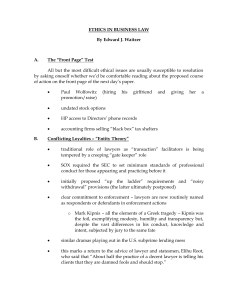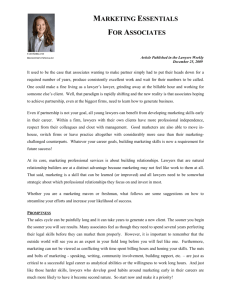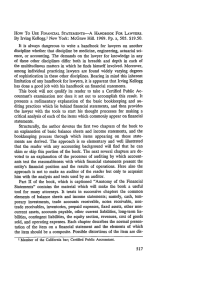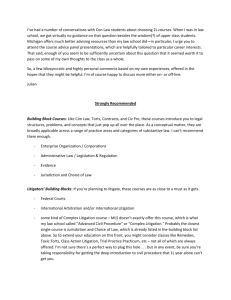Client-Lawyer Relationship
advertisement
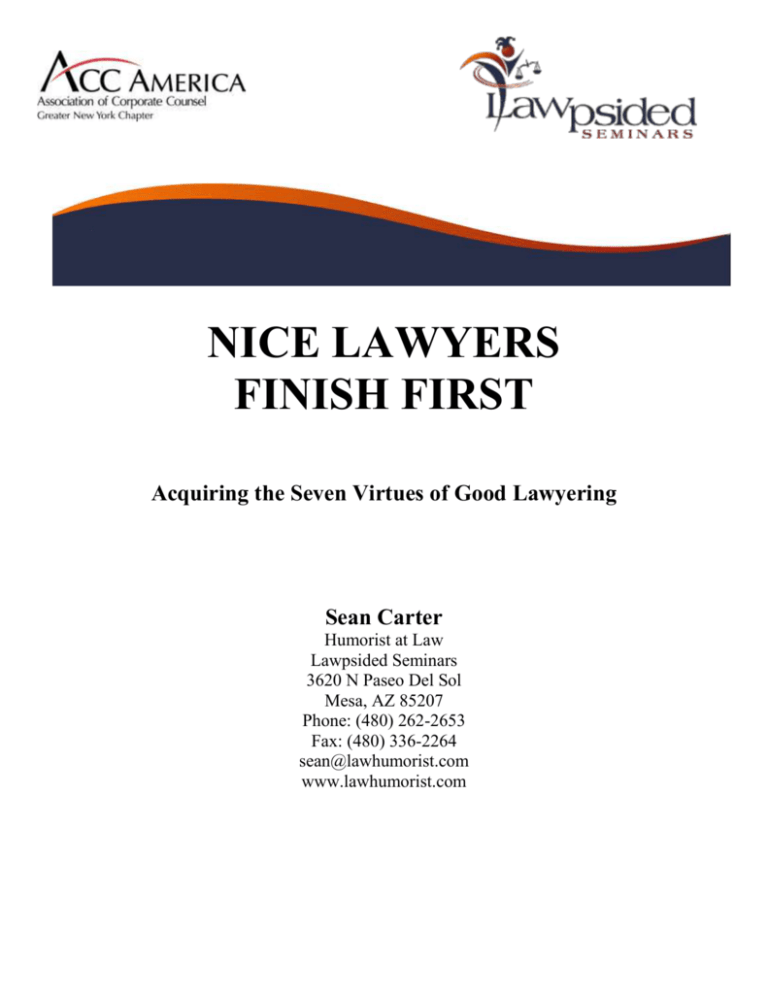
NICE LAWYERS FINISH FIRST Acquiring the Seven Virtues of Good Lawyering Sean Carter Humorist at Law Lawpsided Seminars 3620 N Paseo Del Sol Mesa, AZ 85207 Phone: (480) 262-2653 Fax: (480) 336-2264 sean@lawhumorist.com www.lawhumorist.com Sean Carter Humorist at Law Lawpsided Seminars Mesa, Arizona Sean Carter is the founder of Lawpsided Seminars, a company devoted to solid legal continuing education with a healthy dose of laughter. Mr. Carter graduated from Harvard Law School in 1992. His ten years of legal practice focused on corporate securities and mergers and acquisitions. During this time, he represented such clients as GNC, Experian, The Boston Beer Company, Homeside Lending, Safelite Auto Glass, J. Crew and many others, before eventually serving as inhouse counsel to a publicly-traded finance company. In 2002, Mr. Carter left the practice of law to pursue a career as the country’s foremost Humorist at Law. Since then, Mr. Carter has crisscrossed the country delivering his Lawpsided Seminars for state and local bar associations, law firms, in-house corporate legal departments and law schools. Each year, he presents more than 100 humorous programs on such topics as legal ethics, stress management, constitutional law, legal marketing and much more. Mr. Carter is the author of the first-ever comedic legal treatise -- If It Does Not Fit, Must You Acquit?: Your Humorous Guide to the Law. His syndicated legal humor column has appeared in general circulation newspapers in more than 30 states and his weekly humor column for lawyers appeared in the ABA e-Report from 2003 to 2006. Finally, Sean lives in Mesa, Arizona with his wife and four sons. Nice Lawyers Finish First NEW YORK STATE UNIFIED COURT SYSTEM STANDARDS of CIVILITY Preamble The New York State Standards of Civility for the legal profession set forth principles of behavior to which the bar, the bench and court employees should aspire. They are not intended as rules to be enforced by sanction or disciplinary action, nor are they intended to supplement or modify the Rules Governing Judicial Conduct, the Code of Professional Responsibility and its Disciplinary Rules, or any other applicable rule or requirement governing conduct. Instead they are a set of guidelines intended to encourage lawyers, judges and court personnel to observe principles of civility and decorum, and to confirm the legal profession’s rightful status as an honorable and respected profession where courtesy and civility are observed as a matter of course. The Standards are divided into four parts: lawyers’ duties to other lawyers, litigants and witnesses; lawyers’ duties to the court and court personnel; judges’ duties to lawyers, parties and witnesses; and court personnel’s duties to lawyers and litigants. As lawyers, judges and court employees, we are all essential participants in the judicial process. That process cannot work effectively to serve the public unless we first treat each other with courtesy, respect and civility. Lawyers’ Duties to Other Lawyers, Litigants and Witnesses I. II. Lawyers should be courteous and civil in all professional dealings with other persons. A. Lawyers should act in a civil manner regardless of the ill feelings that their clients may have toward others. B. Lawyers can disagree without being disagreeable. Effective representation does not require antagonistic or acrimonious behavior. Whether orally or in writing, lawyers should avoid vulgar language, disparaging personal remarks or acrimony toward other counsel, parties or witnesses. C. Lawyers should require that persons under their supervision conduct themselves with courtesy and civility. When consistent with their clients’ interests, lawyers should cooperate with opposing counsel in an effort to avoid litigation and to resolve litigation that has already commenced. A. Lawyers should avoid unnecessary motion practice or other judicial intervention by negotiating and agreeing with other counsel whenever it is practicable to do so. B. Lawyers should allow themselves sufficient time to resolve any dispute or disagreement by communicating with one another and imposing reasonable and meaningful deadlines in light of the nature and status of the case. Nice Lawyers Finish First III. A lawyer should respect the schedule and commitments of opposing counsel, consistent with protection of the client’s interests. A. In the absence of a court order, a lawyer should agree to reasonable requests for extensions of time or for waiver of procedural formalities when the legitimate interests of the client will not be adversely affected. B. Upon request coupled with the simple representation by counsel that more time is required, the first request for an extension to respond to pleadings ordinarily should be granted as a matter of courtesy. C. A lawyer should not attach unfair or extraneous conditions to extensions of time. A lawyer is entitled to impose conditions appropriate to preserve rights that an extension might otherwise jeopardize, and may request, but should not unreasonably insist on, reciprocal scheduling concessions. D. A lawyer should endeavor to consult with other counsel regarding scheduling matters in a good faith effort to avoid scheduling conflicts. A lawyer should likewise cooperate with opposing counsel when scheduling changes are requested, provided the interests of his or her client will not be jeopardized. E. A lawyer should notify other counsel and, if appropriate, the court or other persons at the earliest possible time when hearings, depositions, meetings or conferences are to be canceled or postponed. IV. A lawyer should promptly return telephone calls and answer correspondence reasonably requiring a response. V. The timing and manner of service of papers should not be designed to cause disadvantage to the party receiving the papers. VI. VII. A. Papers should not be served in a manner designed to take advantage of an opponent’s known absence from the office. B. Papers should not be served at a time or in a manner designed to inconvenience an adversary. C. Unless specifically authorized by law or rule, a lawyer should not submit papers to the court without serving copies of all such papers upon opposing counsel in such a manner that opposing counsel will receive them before or contemporaneously with the submission to the court. A lawyer should not use any aspect of the litigation process, including discovery and motion practice, as a means of harassment or for the purpose of unnecessarily prolonging litigation or increasing litigation expenses. A. A lawyer should avoid discovery that is not necessary to obtain facts or perpetuate testimony or that is designed to place an undue burden or expense on a party. B. A lawyer should respond to discovery requests reasonably and not strain to interpret the request so as to avoid disclosure of relevant and non-privileged information. In depositions and other proceedings, and in negotiations, lawyers should conduct Nice Lawyers Finish First themselves with dignity and refrain from engaging in acts of rudeness and disrespect. A. Lawyers should not engage in any conduct during a deposition that would not be appropriate in the presence of a judge. B. Lawyers should advise their clients and witnesses of the proper conduct expected of them in court, at depositions and at conferences, and, to the best of their ability, prevent clients and witnesses from causing disorder or disruption. C. A lawyer should not obstruct questioning during a deposition or object to deposition questions unless necessary. D. Lawyers should ask only those questions they reasonably believe are necessary for the prosecution or defense of an action. Lawyers should refrain from asking repetitive or argumentative questions and from making self-serving statements. VIII. A lawyer should adhere to all express promises and agreements with other counsel, whether oral or in writing, and to agreements implied by the circumstances or by local customs. IX. Lawyers should not mislead other persons involved in the litigation process. X. A. A lawyer should not falsely hold out the possibility of settlement as a means for adjourning discovery or delaying trial. B. A lawyer should not ascribe a position to another counsel that counsel has not taken or otherwise seek to create an unjustified inference based on counsel’s statements or conduct. C. In preparing written versions of agreements and court orders, a lawyer should attempt to correctly reflect the agreement of the parties or the direction of the court. Lawyers should be mindful of the need to protect the standing of the legal profession in the eyes of the public. Accordingly, lawyers should bring the New York State Standards of Civility to the attention of other lawyers when appropriate. Lawyers’ Duties to the Court and Court Personnel I. A lawyer is both an officer of the court and an advocate. As such, the lawyer should always strive to uphold the honor and dignity of the profession, avoid disorder and disruption in the courtroom, and maintain a respectful attitude toward the court. A. Lawyers should speak and write civilly and respectfully in all communications with the court and court personnel. B. Lawyers should use their best efforts to dissuade clients and witnesses from causing disorder or disruption in the courtroom. C. Lawyers should not engage in conduct intended primarily to harass or humiliate witnesses. D. Lawyers should be punctual and prepared for all court appearances; if delayed, the lawyer should notify the court and counsel whenever possible. Nice Lawyers Finish First II. Court personnel are an integral part of the justice system and should be treated with courtesy and respect at all times. Nice Lawyers Finish First Statement of Client’s Rights (As adopted by the Administrative Board of the Courts) 1. You are entitled to be treated with courtesy and consideration at all times by your lawyer and the other lawyers and personnel in your lawyer’s office. 2. You are entitled to an attorney capable of handling your legal matter competently and diligently, in accordance with the highest standards of the profession. If you are not satisfied with how your matter is being handled, you have the right to withdraw from the attorneyclient relationship at any time (court approval may be required in some matters and your attorney may have a claim against you for the value of services rendered to you up to the point of discharge). 3. You are entitled to your lawyer’s independent professional judgment and undivided loyalty uncompromised by conflicts of interest. 4. You are entitled to be charged a reasonable fee and to have your lawyer explain at the outset how the fee will be computed and the manner and frequency of billing. You are entitled to request and receive a written itemized bill from your attorney at reasonable intervals. You may refuse to enter into any fee arrangement that you find unsatisfactory. In the event of a fee dispute, you may have the right to seek arbitration; your attorney will provide you with the necessary information regarding arbitration in the event of a fee dispute, or upon your request. 5. You are entitled to have your questions and concerns addressed in a prompt manner and to have your telephone calls returned promptly. 6. You are entitled to be kept informed as to the status of your matter and to request and receive copies of papers. You are entitled to sufficient information to allow you to participate meaningfully in the development of your matter. 7. You are entitled to have your legitimate objectives respected by your attorney, including whether or not to settle your matter (court approval of a settlement is required in some matters). 8. You have the right to privacy in your dealings with your lawyer and to have your secrets and confidences preserved to the extent permitted by law. 9. You are entitled to have your attorney conduct himself or herself ethically in accordance with the Code of Professional Responsibility. 10. You may not be refused representation on the basis of race, creed, color, age, religion, sex, sexual orientation, national origin or disability. Nice Lawyers Finish First Virtue #1 Chastity Definition: “Abstaining from sexual conduct according to one’s state in life; the practice of courtly love and romantic friendship. Cleanliness through cultivated good health and hygiene, and maintained by refraining from intoxicants. To be honest with oneself, one’s family, one’s friends, and to all of humanity. Embracing of moral wholesomeness and achieving purity of thought through education and betterment. The ability to refrain from being distracted and influenced by hostility, temptation or corruption.” Standards of Civility Lawyers’ Duties to Other Lawyers, Litigants and Witnesses VIII. A lawyer should adhere to all express promises and agreements with other counsel, whether oral or in writing, and to agreements implied by the circumstances or by local customs. IX. Lawyers should not mislead other persons involved in the litigation process. X. A. A lawyer should not falsely hold out the possibility of settlement as a means for adjourning discovery or delaying trial. C. In preparing written versions of agreements and court orders, a lawyer should attempt to correctly reflect the agreement of the parties or the direction of the court. Lawyers should be mindful of the need to protect the standing of the legal profession in the eyes of the public. Accordingly, lawyers should bring the New York State Standards of Civility to the attention of other lawyers when appropriate. Statement of Client’s Rights 9. You are entitled to have your attorney conduct himself or herself ethically in accordance with the Code of Professional Responsibility. Nice Lawyers Finish First Virtue #2 Temperance Definition: “Restraint, temperance, justice. Constant mindfulness of others and one’s surroundings; practicing self-control, abstention, moderation, zero-sum and deferred gratification. Prudence to judge between actions with regard to appropriate actions at a given time. Proper moderation between self-interest, versus public-interest, and against the rights and needs of others.” Standards of Civility Lawyers’ Duties to Other Lawyers, Litigants and Witnesses I. VII. Lawyers should be courteous and civil in all professional dealings with other persons. A. Lawyers should act in a civil manner regardless of the ill feelings that their clients may have toward others. B. Lawyers can disagree without being disagreeable. Effective representation does not require antagonistic or acrimonious behavior. Whether orally or in writing, lawyers should avoid vulgar language, disparaging personal remarks or acrimony toward other counsel, parties or witnesses. C. Lawyers should require that persons under their supervision conduct themselves with courtesy and civility. In depositions and other proceedings, and in negotiations, lawyers should conduct themselves with dignity and refrain from engaging in acts of rudeness and disrespect. A. Lawyers should not engage in any conduct during a deposition that would not be appropriate in the presence of a judge. B. Lawyers should advise their clients and witnesses of the proper conduct expected of them in court, at depositions and at conferences, and, to the best of their ability, prevent clients and witnesses from causing disorder or disruption. Lawyers’ Duties to the Court and Court Personnel I. A lawyer is both an officer of the court and an advocate. As such, the lawyer should always strive to uphold the honor and dignity of the profession, avoid disorder and disruption in the courtroom, and maintain a respectful attitude toward the court. Nice Lawyers Finish First II. A. Lawyers should speak and write civilly and respectfully in all communications with the court and court personnel. B. Lawyers should use their best efforts to dissuade clients and witnesses from causing disorder or disruption in the courtroom. C. Lawyers should not engage in conduct intended primarily to harass or humiliate witnesses. Court personnel are an integral part of the justice system and should be treated with courtesy and respect at all times. Statement of Client’s Rights 1. You are entitled to be treated with courtesy and consideration at all times by your lawyer and the other lawyers and personnel in your lawyer’s office. 8. You have the right to privacy in your dealings with your lawyer and to have your secrets and confidences preserved to the extent permitted by law. Nice Lawyers Finish First Virtue #3 Charity Definition: “Generosity, charity, self-sacrifice; the term should not be confused with the more restricted modern use of the word charity to mean benevolent giving.” Standards of Civility Lawyers’ Duties to Other Lawyers, Litigants and Witnesses III. A lawyer should respect the schedule and commitments of opposing counsel, consistent with protection of the client’s interests. A. In the absence of a court order, a lawyer should agree to reasonable requests for extensions of time or for waiver of procedural formalities when the legitimate interests of the client will not be adversely affected. B. Upon request coupled with the simple representation by counsel that more time is required, the first request for an extension to respond to pleadings ordinarily should be granted as a matter of courtesy. C. A lawyer should not attach unfair or extraneous conditions to extensions of time. A lawyer is entitled to impose conditions appropriate to preserve rights that an extension might otherwise jeopardize, and may request, but should not unreasonably insist on, reciprocal scheduling concessions. Nice Lawyers Finish First Virtue #4 Diligence Definition: “A zealous and careful nature in one’s actions and work; decisive work ethic, steadfastness in belief, fortitude, and the capability of not giving up. Budgeting one’s time; monitoring one’s own activities to guard against laziness. Upholding one’s convictions at all times, especially when no one else is watching (integrity).” Standards of Civility Lawyers’ Duties to Other Lawyers, Litigants and Witnesses II. When consistent with their clients’ interests, lawyers should cooperate with opposing counsel in an effort to avoid litigation and to resolve litigation that has already commenced. B. IV. Lawyers should allow themselves sufficient time to resolve any dispute or disagreement by communicating with one another and imposing reasonable and meaningful deadlines in light of the nature and status of the case. A lawyer should promptly return telephone calls and answer correspondence reasonably requiring a response. Lawyers’ Duties to the Court and Court Personnel I. A lawyer is both an officer of the court and an advocate. As such, the lawyer should always strive to uphold the honor and dignity of the profession, avoid disorder and disruption in the courtroom, and maintain a respectful attitude toward the court. D. Lawyers should be punctual and prepared for all court appearances; if delayed, the lawyer should notify the court and counsel whenever possible. Statement of Client’s Rights 2. You are entitled to an attorney capable of handling your legal matter competently and diligently, in accordance with the highest standards of the profession. If you are not satisfied with how your matter is being handled, you have the right to withdraw from the attorneyclient relationship at any time (court approval may be required in some matters and your Nice Lawyers Finish First attorney may have a claim against you for the value of services rendered to you up to the point of discharge). 5. You are entitled to have your questions and concerns addressed in a prompt manner and to have your telephone calls returned promptly. 6. You are entitled to be kept informed as to the status of your matter and to request and receive copies of papers. You are entitled to sufficient information to allow you to participate meaningfully in the development of your matter. 7. You are entitled to have your legitimate objectives respected by your attorney, including whether or not to settle your matter (court approval of a settlement is required in some matters). Nice Lawyers Finish First Virtue #5 Patience Definition: “Forbearance and endurance through moderation. Resolving conflicts and injustice peacefully. Creating a sense of peaceful stability and community, rather than engendering suffering, hostility and antagonism.” Standards of Civility Lawyers’ Duties to Other Lawyers, Litigants and Witnesses II. When consistent with their clients’ interests, lawyers should cooperate with opposing counsel in an effort to avoid litigation and to resolve litigation that has already commenced. A. VI. VII. Lawyers should avoid unnecessary motion practice or other judicial intervention by negotiating and agreeing with other counsel whenever it is practicable to do so. A lawyer should not use any aspect of the litigation process, including discovery and motion practice, as a means of harassment or for the purpose of unnecessarily prolonging litigation or increasing litigation expenses. A. A lawyer should avoid discovery that is not necessary to obtain facts or perpetuate testimony or that is designed to place an undue burden or expense on a party. B. A lawyer should respond to discovery requests reasonably and not strain to interpret the request so as to avoid disclosure of relevant and non-privileged information. In depositions and other proceedings, and in negotiations, lawyers should conduct themselves with dignity and refrain from engaging in acts of rudeness and disrespect. D. Lawyers should ask only those questions they reasonably believe are necessary for the prosecution or defense of an action. Lawyers should refrain from asking repetitive or argumentative questions and from making self-serving statements. Nice Lawyers Finish First Virtue #6 Kindness Definition: “Charity, compassion and friendship for its own sake. Empathy and trust without prejudice or resentment. Unselfish love and voluntary kindness without bias or spite. Having positive outlooks and cheerful demeanor; to inspire kindness in others.” Standards of Civility Lawyers’ Duties to Other Lawyers, Litigants and Witnesses III. A lawyer should respect the schedule and commitments of opposing counsel, consistent with protection of the client’s interests. E. V. A lawyer should notify other counsel and, if appropriate, the court or other persons at the earliest possible time when hearings, depositions, meetings or conferences are to be canceled or postponed. The timing and manner of service of papers should not be designed to cause disadvantage to the party receiving the papers. A. Papers should not be served in a manner designed to take advantage of an opponent’s known absence from the office. B. Papers should not be served at a time or in a manner designed to inconvenience an adversary. C. Unless specifically authorized by law or rule, a lawyer should not submit papers to the court without serving copies of all such papers upon opposing counsel in such a manner that opposing counsel will receive them before or contemporaneously with the submission to the court. IX. Lawyers should not mislead other persons involved in the litigation process. B. A lawyer should not ascribe a position to another counsel that counsel has not taken or otherwise seek to create an unjustified inference based on counsel’s statements or conduct. Nice Lawyers Finish First Virtue #7 Humility Definition: “Modest behavior, selflessness, and the giving of respect. Humility is not thinking less of yourself, it is thinking of yourself less. It is a spirit of self-examination; a hermeneutic of suspicion toward yourself and charity toward people you disagree with. The courage of the heart necessary to undertake tasks which are difficult, tedious or unglamorous, and to graciously accept the sacrifices involved. Giving credit where credit is due; not unfairly glorifying one’s own self.” Statement of Client’s Rights 3. You are entitled to your lawyer’s independent professional judgment and undivided loyalty uncompromised by conflicts of interest. 4. You are entitled to be charged a reasonable fee and to have your lawyer explain at the outset how the fee will be computed and the manner and frequency of billing. You are entitled to request and receive a written itemized bill from your attorney at reasonable intervals. You may refuse to enter into any fee arrangement that you find unsatisfactory. In the event of a fee dispute, you may have the right to seek arbitration; your attorney will provide you with the necessary information regarding arbitration in the event of a fee dispute, or upon your request. 10. You may not be refused representation on the basis of race, creed, color, age, religion, sex, sexual orientation, national origin or disability.
